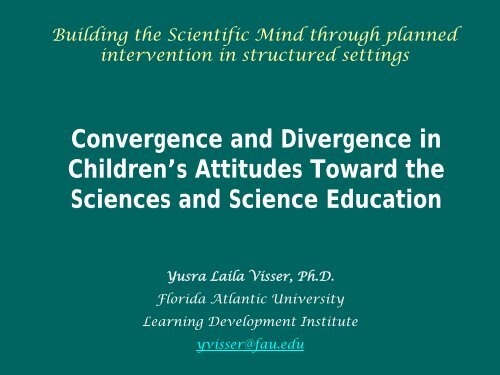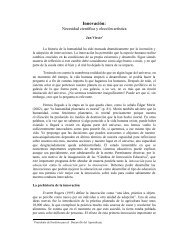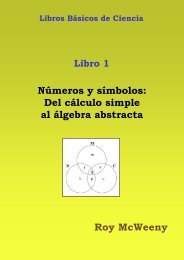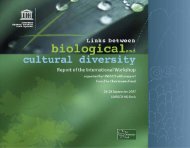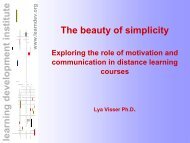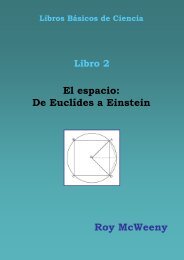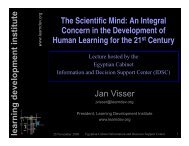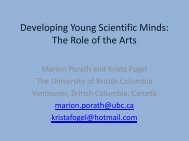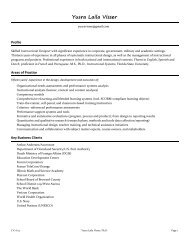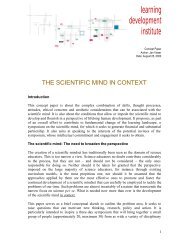PowerPoint slide show on Convergence and Divergence in ...
PowerPoint slide show on Convergence and Divergence in ...
PowerPoint slide show on Convergence and Divergence in ...
- No tags were found...
Create successful ePaper yourself
Turn your PDF publications into a flip-book with our unique Google optimized e-Paper software.
Build<strong>in</strong>g the Scientific M<strong>in</strong>d through planned<strong>in</strong>terventi<strong>on</strong> <strong>in</strong> structured sett<strong>in</strong>gsC<strong>on</strong>vergence <strong>and</strong> <strong>Divergence</strong> <strong>in</strong>Children’s Attitudes Toward theSciences <strong>and</strong> Science Educati<strong>on</strong>Yusra Laila Visser, Ph.D.Florida Atlantic UniversityLearn<strong>in</strong>g Development Instituteyvisser@fau.edu
C<strong>on</strong>necti<strong>on</strong> to BtSM Aims1. Determ<strong>in</strong>e the c<strong>on</strong>diti<strong>on</strong>s that fosterdevelopment of the scientific m<strong>in</strong>d:formal sett<strong>in</strong>gs2. Establish practical ways to improve <strong>and</strong>complement exist<strong>in</strong>g efforts to developthe scientific m<strong>in</strong>d3. Break open the too narrowly def<strong>in</strong>edresearch agendas <strong>and</strong> practices
Science <strong>and</strong> the ec<strong>on</strong>omy• In the UK, there will be a 12% <strong>in</strong>crease <strong>in</strong> dem<strong>and</strong> forScience professi<strong>on</strong>als from 1996-2006• Number of scientists per milli<strong>on</strong> of populace (1993):Japan 3500USA 2700Europe 1600Lat<strong>in</strong> America 209Asia 99Africa 53
Attitudes• Express our evaluati<strong>on</strong> of someth<strong>in</strong>g orsome<strong>on</strong>e– evaluative c<strong>on</strong>sistency–Target• Stable: Once acquired, they are hard tochange• Lack of generally accepted term<strong>in</strong>ology -(Encyclopædia Britannica Onl<strong>in</strong>e)
Why attitudes matter1. The “sw<strong>in</strong>g from science”2. Attitudes impact implicit motivati<strong>on</strong>,which impacts– academic effort– future activities <strong>in</strong> school <strong>and</strong> society
Attitude toward Science<strong>and</strong> Science Educati<strong>on</strong>Intr<strong>in</strong>sic Motivati<strong>on</strong>Enhanced Effort &Process<strong>in</strong>gC<strong>on</strong>t<strong>in</strong>u<strong>in</strong>g Motivati<strong>on</strong>
The good news• Applicati<strong>on</strong>s-based Physics course results <strong>in</strong>positive attitude toward Physics• Attitude str<strong>on</strong>gly impacted by quality ofteach<strong>in</strong>g - In our c<strong>on</strong>trol• Much evidence that students feel science isuseful <strong>and</strong> <strong>in</strong>terest<strong>in</strong>g• % of girls go<strong>in</strong>g <strong>in</strong>to science-related fields <strong>in</strong> theUK has <strong>in</strong>creased from 1979-2000
The not-so-good news“the absence of history or c<strong>on</strong>text, thetyranny of technique, the isolati<strong>on</strong> of thelearner <strong>and</strong> the struggle to attend <strong>in</strong> asea of <strong>in</strong>attentiveness”– Student explanati<strong>on</strong> for turn<strong>in</strong>g away fromScience <strong>in</strong> college (Tobias, 1990)
The not-so-good news• The number of students tak<strong>in</strong>g science <strong>and</strong> math at A–level (<strong>in</strong> the UK):– 42% <strong>in</strong> 1963– 16% <strong>in</strong> 1993.• One of the variables most str<strong>on</strong>gly impact<strong>in</strong>g attitudesis gender• Attitude toward (school) science decl<strong>in</strong>es with entry<strong>in</strong>to sec<strong>on</strong>dary school– especially for girls
The not-so-good news• Recognized value of science does not implyappreciati<strong>on</strong> for science educati<strong>on</strong>:– 72% of sample <strong>in</strong>dicated science is important– 40% of sample <strong>in</strong>dicated science class is bor<strong>in</strong>g(Ebeneezer <strong>and</strong> Zoller, 1993)• Boys have a c<strong>on</strong>sistently more positive attitudetoward school science than girls– effect is str<strong>on</strong>ger <strong>in</strong> Physics than <strong>in</strong> Biology– effect is str<strong>on</strong>gest <strong>in</strong> general science (We<strong>in</strong>burgh, 1995)
World Year of Physics• % of girls <strong>in</strong> Physics college degrees is not<strong>in</strong>creas<strong>in</strong>g <strong>in</strong> the UK– Rates have <strong>in</strong>creased <strong>in</strong> all other science programs• Male:female ratio:– Physics is 3.4:1– Biology is 1:1.6• Physics rates poorly <strong>in</strong> terms of attitudes:– 50% do not enjoy Physics at all or very little– 60% enjoy Biology quite a lot
World Year of Physics• Scotl<strong>and</strong> & The Netherl<strong>and</strong>s– attitudes toward Physics not lower– Physics taught by qualified Physics teachers• Decisi<strong>on</strong> to pursue Physics most str<strong>on</strong>glyimpacted by math <strong>and</strong> science scores– Re<strong>in</strong>forc<strong>in</strong>g that physics is for the <strong>in</strong>telligent,<strong>and</strong> therefore difficult
The unexpected news• “Science after Grade 10 will cheat me out ofwell-rounded liberal educati<strong>on</strong>”– Girls: limited to unappeal<strong>in</strong>g scientific careers• Survey of students who dropped sciencecourses:– 71% rated science as <strong>in</strong>terest<strong>in</strong>g– 79% felt practical work was enjoyable– 76% felt that it helped you to underst<strong>and</strong> th<strong>in</strong>gs <strong>in</strong>everyday life
The unexpected news• Curriculum materials <strong>and</strong> <strong>in</strong>structi<strong>on</strong>altechniques doesn’t seem to significantlyimpact student attitudes– as opposed to teach<strong>in</strong>g quality• Lower SES associated with higher <strong>in</strong>terest<strong>in</strong> school science• Science attitudes may not be correlatedwith achievement– Children can achieve <strong>in</strong> school sciencewithout a positive attitude
The useful news• Science attitude most str<strong>on</strong>gly affected byscience teach<strong>in</strong>g• Most positive attitudes toward school sciencewith:– High level of <strong>in</strong>volvement– Very high level of pers<strong>on</strong>al support– Str<strong>on</strong>g positive relati<strong>on</strong>ships with classmates– Use of variety <strong>and</strong> unusual techniques• Teachers are happiest <strong>and</strong> most enthusiasticwhen teach<strong>in</strong>g the subject they specialize <strong>in</strong>
What “BtSM-ers” mightexplore & ask questi<strong>on</strong>s about1. Scientific tra<strong>in</strong><strong>in</strong>g is a type of educati<strong>on</strong> thatproduces a “useful specialist” but not “a trulyeducated man” (Mathew Arnold, 19 th Century)– What are the implicati<strong>on</strong>s for BtSM?2. Difference <strong>in</strong> girls <strong>and</strong> boys attitudes towardscience courses is str<strong>on</strong>gest <strong>in</strong> general science– Does this doom girls <strong>in</strong> develop<strong>in</strong>g nati<strong>on</strong>s, wherefew make it past general science courses?
What “BtSM-ers” mightexplore & ask questi<strong>on</strong>s about3.“Actual experience with science at school doesnot seem to be related to attitude towardscience as a worthwhile societalenterprise…Science at school should <strong>and</strong>science out of school should be treated asdist<strong>in</strong>ct <strong>and</strong> separate entities”– Is this really what we should be do<strong>in</strong>g?4. The smallest school– How do we use ensure it c<strong>on</strong>tributes to BtSM?
What “BtSM-ers” mightexplore & ask questi<strong>on</strong>s about5. “The essential ir<strong>on</strong>y of a discipl<strong>in</strong>e that offers<strong>in</strong>tellectual liberati<strong>on</strong> from the shackles ofreceived wisdom is that the educati<strong>on</strong> it offersis authoritarian, dogmatic, <strong>and</strong> n<strong>on</strong>-reflexive”– What can be d<strong>on</strong>e to modify this?6. Little is known about how <strong>and</strong> why attitudestoward science change.– Attitudes are <strong>in</strong>tegral to BtSM. Knowledge is oftenephemeral. How can we br<strong>in</strong>g clarity to this topic?


